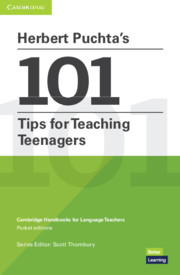 Herbert Puchta's 101 Tips for Teaching Teenagers
Herbert Puchta's 101 Tips for Teaching Teenagers Book contents
A - Motivation
Published online by Cambridge University Press: 28 October 2023
Summary
Teaching teens can be a huge challenge if they can't see how English will be of advantage to them in their future, nor indeed how the learning process itself can engage them and arouse their curiosity. The tips in this section are a balance of serious interactions and elements of surprise, fun and gamification. They will help you not only reach out to your learners through your own enthusiasm, but also create a warm and welcoming classroom atmosphere while you challenge and support them on their individual learning paths.
1 An energy booster to start the lesson
2 Show your enthusiasm
3 Help learners see why learning English is important
4 Make deals
5 Turn the classroom into a special place
6 Gamify learning
7 Teach outdoors occasionally
8 Take your learners’ learning seriously
9 Empower learners by asking them to teach you
10 Break routines
11 Use rewards artfully
12 Support learners who show self-doubt and negative beliefs
1 An energy booster to start the lesson
At the beginning of a class, teens can be sluggish. This activity usually raises their energy levels straight away.
I have frequently used this game as soon as the lesson starts, especially while I’m waiting for a latecomer; they can easily join in without disturbing the class.
• Ask the learners to stand up. Say you will ask them a question, and that those who know the answer can sit down. Although they can cheat by sitting down without knowing the answer, if you suspect that, you will ask them for the answer. If you’re right, the game is over for them and they must take their chair to the front of the class and sit on it until a new game starts. If you’re wrong, they are still in the game, of course.
• Ask the first question, usually about content from the previous lesson.
• In the first few rounds use some pretty challenging questions, so that not too many learners will get the opportunity to sit down straight away. Also, I don't usually ask a check question then. That raises the suspense and the level of fun for the learners.
• When learners sit down, look at them suspiciously. I do this in an exaggerated way and this usually creates quite a bit of laughter.
• Once everyone is seated, tell them to stand up again.
- Type
- Chapter
- Information
- Herbert Puchta's 101 Tips for Teaching TeenagersCambridge Handbooks for Language Teachers Pocket editions, pp. 1 - 13Publisher: Cambridge University PressPrint publication year: 2020


